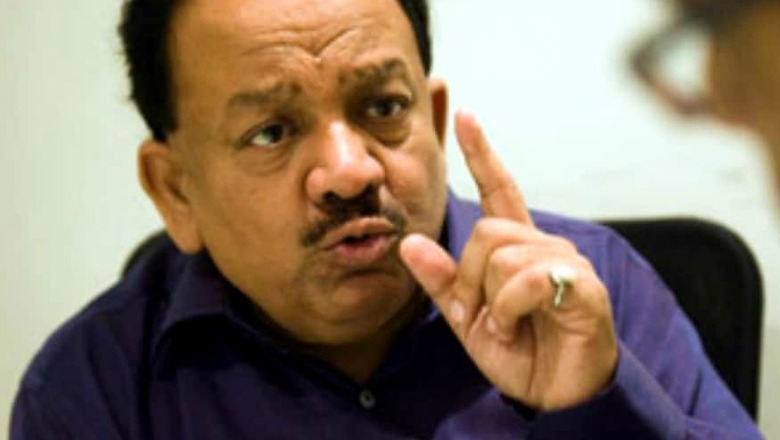
views
New Delhi: Asserting that the hallmark of India's efforts in dealing with the coronavirus outbreak was a pre-emptive and proactive approach, Health Minister Harsh Vardhan on Sunday underlined the gains of the prevailing lockdown and said the country created a people's movement to combat the pandemic.
Speaking at a meeting of G20 ministers organised by the grouping's chair Saudi Arabia via video-conferencing, Vardhan said India has completed 25 days of the lockdown which will further extend till May 3 and its positive results were evident.
"The results of the same were realised when our case doubling rate which was about 3.4 days on March 17, dropped to 4.4 days by March 25, and is currently about 7.4 days," he told the G-20 health ministers.
India has successfully tackled public health emergencies of international concern and pandemic in the past as well, Vardhan asserted.
"This time the hallmark of our approach has been fivefold -- maintaining a continuous situation awareness; pre-emptive and proactive approach; graded response as per continuously evolving scenario; inter-sectoral coordination at all levels, and lastly but most importantly creating a people's movement to combat this disease," he said.
Vardhan's participation at the virtual meeting of the grouping comes after the March 26 emergency G-20 Summit in which Prime Minister Narendra Modi participated through video-conferencing and pitched for developing a new crisis management protocol to deal with the global health crisis.
In his address, Modi had also urged the grouping to come out with a concrete action plan to fight the pandemic and said human beings rather than economic targets should be put at the centre of its vision for global prosperity and cooperation.
The G-20 grouping shares 80 per cent of world GDP and 60 per cent of world population.
Vardhan, in his remarks at the meeting, said India started surveillance of flights from COVID-affected countries twelve days before the first case in India on January 30.
By March 22, with less than 400 cases India banned all international flights to and from India, and by March 25 implemented a nationwide lockdown, he pointed out.
"In the past, we as a global community have faced and successfully tackled threats to the health of our people, by a collective sense of purpose, supporting and collaborating with each other. I look forward to similar cooperation and mutually respectful & useful collaborations to deal with coronavirus," Vardhan was quoted as saying in an official statement.
While some of the countries particularly Japan, Singapore, South Korea have fared well, others are still struggling with COVID-19, he noted.
The scale of impact is unprecedented and therefore calls for cooperation between nations to attain normalcy, he said.
"In the absence of any specific drug or vaccine, India has also relied on various non-pharmacological interventions. Particular focus was on measures like social distancing and risk communication to the masses on simple public health interventions like hand hygiene and respiratory etiquettes," he said.
Since the onset of this pandemic, India has taken leadership and assisted neighbouring countries in multitude of ways, Vardhan said.
"During medical evacuation undertaken by India from Wuhan, China as well as from COVID-19 affected Diamond Princess Cruise ship, we evacuated foreign nationals from Maldives, Bangladesh, Myanmar, Maldives, South Africa, USA, Madagascar, Sri Lanka, Nepal, South Africa and Peru," he said.
India as a global leader in pharmaceutical has stepped up production to make sure supplies of drugs like hydroxychloroquine to countries around the world, Vardhan said.
India is working with global partners to ensure that effective drugs and vaccines can be developed, he said.
Much before the outbreak was declared a public health emergency of international concern by the World Health Organization, India was ahead in implementing actions targeting core capacities as mandated under the international health regulations, he said.
The Integrated Disease Surveillance Programme (IDSP), which is a nation-wide surveillance system for epidemic prone diseases has been activated towards the COVID response, and is being further strengthened with substantive digital inputs, he said.
"India has made the conscious decision to focus on building exclusive infrastructure for management of COVID patients so that there is no intermingling of COVID patients," the minister said.
"All the people who are tested positive are treated in one of three types of dedicated COVID management centers: COVID care centers for mild symptomatic cases, COVID health centers for moderate cases and COVID hospitals for severe cases," he said.
"While the traditional ways and means to tackle the disease were being implemented, our scientists and doctors are exploring new and innovative measures to maximize our reach," he said.
Cutting edge technology is being used to not only maintain inventory and patient level information, direct to citizen apps are being used for communicating geospatial risk and best practices to be followed, Vardhan said.
G-20 is an international grouping for the governments of 19 countries and the European Union (EU). The 19-member countries of G20 are Argentina, Australia, Brazil, Canada, China, Germany, France, Indonesia, Italy, Japan, Mexico, the Russian Federation, Saudi Arabia, South Africa, South Korea, Turkey, United Kingdom, USA and India.




















Comments
0 comment